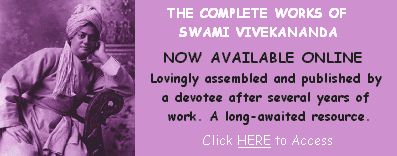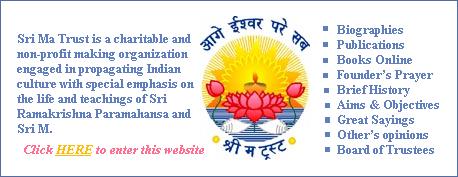

 Listen to a 60 second rendition of the Gayatri Mantra
Listen to a 60 second rendition of the Gayatri Mantra 


  |


|
Glossary: Narendra = Narendranath = Naren = Swami Vivekananda Master = Thakur = Sri Ramakrishna Compliments of Dr. C. S. Shah Regret to inform you that father passed away on 24th Apr 2004 leaving his fond memories and imprints on my heart. Shantanu [Dr C S Shah's son] Introduction Rarely does humanity witness a combination of a great Guru (Spiritual Teacher) and equally capable Shishya (spiritual aspirant). Upanishads and the Gita do mention of such noble pairs, when the fully primed aspirant seeking higher knowledge humbly bows down to the Teacher, and says, "O sir, please tell me 'what is that by knowing which nothing else remains to be known'. Give me that, acquiring which all desires nullify. O gracious one, I surrender at your feet; please tell me what is right for me." And the compassionate Teacher describes the nature of Atman and Brahman, starting as external reality to begin with, but culminating into true knowledge of our inner soul as Brahman. As Guru spoke, so did the aspirant (sadhaka) experience the Truth contained in those words. It was as if a film on Brahman was being run in front of the yearning aspirant. One such pair flourished in the last two decades of nineteenth century, when Sri Ramakrishna Paramahamsa sculpted the most wonderful masterpiece in the form of Swami Vivekananda out of raw skeptical, rational but fearless and dynamic Narendranath. Their association has unleashed such a tremendous spiritual force that it has already started destroying the dross and dreary ignorance covering the minds and hearts of mankind all over the globe. To arrest the sectarian influence of onward march of 'scientific reason', to fight the onslaught of external technological progress, which claimed material prosperity as the only goal for humanity, one required answers in the scientific language alone. Language of simplicity and faith was brushed aside as weakness and defeat. Religion was on defensive in the face of clattering advances of science. To combat this destructive march of quasi-purposive science, Swami Vivekananda entered the world arena as a great disciple of Sri Ramakrishna. Swami Vivekananda was born in an educated and well-to-do family in Calcutta, on 12th January 1863. His father was a famous pleader/lawyer, educated and well versed in modern liberal thought and of scientific outlook. He was well traveled and knew many languages including Persian and English. His mother, Bhuvaneshawaridevi, was pious and wise lady devoted to God. She inspired the latent virtues of fearlessness, honesty, justice, and devotion in her son; Narendra as Swami Vivekananda was called in his childhood. She told Narendra stories from Ramayana and Mahabharata, the two greatest Indian Epics, which influenced later life of Swami Vivekananda. From his early childhood, Narendra was naughty, brave, and fearless. He also did not approve of injustice or sycophancy. But his peculiar tendencies in the childhood were 1) ease with which he used to go into intense meditation, and 2) Unusual capacity of intense mental concentration, which made him learn and remember essential subject matter in the books in very short period of time, and that too by just reading once! As an example, let me cite the following example (example is from his later life): Once Swami Vivekananda was reading the volumes of 'Encyclopedia Britannica'. His disciple associate (Sharatchandra Chakravarti), seeing those twenty-four volumes, remarked, "It is difficult to master the contents of so many volumes in one life." He did not know at the time that the Swami had already finished ten volumes and was reading the eleventh. "What do you mean?" said Swamiji. "Ask me whatever you like from those ten volumes and I can tell you all about it." The disciple, out of curiosity, brought down the books and asked Swamiji many questions on difficult and varied topics/subjects, selecting one or two from different volumes. Swami Vivekananda not only replied each correctly, but in many instances he quoted the very language of the books! At an other time, Swami Vivekananda happened to turn the pages of a book in quick succession just by looking at them once. The disciple asked as to what Swamiji was doing. Swami Vivekananda replied, "Why, I am reading the book." The fellow was utterly surprised to see such an odd method of reading the book! Then Swami Vivekananda explained just as a child reads every letter of a word, most of adults read a cluster of words or a full sentence, "I can read paragraph to paragraph"! Thus, three glances and the whole page used to be read! Later he greatly emphasized to cultivate power of mind in the form of purity and concentration for spiritual gains, so also perfection in many arts and studies in science and other branches of education. The versatile and young Narendra was well versed with both Indian and western philosophical thought, including the Vedanta of Upanishads and newer trends in the philosophy of Schopenhauer, Kant, and Hegel in European culture. He once said, "Kant's great achievement was the discovery that 'time, space, and causation are modes of thought,' but Vedanta taught this ages ago and called it 'Maya'. Schopenhauer stands on reason only and rationalizes the Vedas... Shankara maintained the orthodoxy of Vedas." It was a rare combination of science and literature that flourished in the mind of this young man, hungry for knowledge in all the fields. He even went to Calcutta medical school to see for himself the arrangement of brain, spinal cord, and the nerves in the dead bodies in the anatomical museum. He wanted to understand the flow of current etc. in various Kundalini chakras. Equally adept he was in the art of music and singing. His voice was clear, pure, and full with emotion that was sure to bring tears to the eyes of the listeners. Even Sri Ramakrishna used to say, 'no one sings more touchingly than Naren'. He was expert in playing percussion instruments like tabla, mrudung, and especially pakhavaz. Thus equipped with the knowledge of English and Bengali (he also knew some Hindi), art and literature, music and singing (he also had comments about painting!), philosophy and science. Swami Vivekananda presented himself at the holy feet of Sri Ramakrishna in the year 1881, at the tender age of eighteen. Narendra Meets the Mentor In the year 1881 Narendra met Sri Ramakrishna for the first time. As it happened, Sri Ramakrishna had gone to Calcutta to one of his devotee's house. It was near Narendra's. There devotional musical songs were to be sung; but singer didn't turn up for the program. Surendra and Ram, householder devotees of Sri Ramakrishna thought of inviting Narendra to fill up the gap, for they knew the high capabilities of Narendra in singing and playing musical instruments. In fact they were Swami Vivekananda's good friends. Thus came our hero to the house of the devotee and sang one of the most touching songs, in Bengali. The first lines went like these: 'O mind, why loiter in this foreign land wearing foreigner's dress and clothes. Let us go home, to our own land, where we truly belong!' Sri Ramakrishna was visibly moved by the sincerity and quality of Narendra's singing. Tears welled up in the eyes of Sri Ramakrishna, and he lovingly got acquainted with Narendra. He also invited Naren to visit Dakshineswar at his earliest convenience. Moreover, Narendra's English teacher in college once had told the class to visit Sri Ramakrishna Paramhamsa at Dakshineswar to know the exact meaning of the word 'trance', for Sri Ramakrishna often went into that state of superconscious samadhi. Accordingly in the November of 1881, at the age of eighteen, Narendra went to Dakshineswar with his friends. Sri Ramakrishna treated him with utmost love and familiarity, as if they knew each other intimately and were meeting not as strangers but as close old friends! [Sri Ramakrishna in his vision knew Narendra to be a sage who has accompanied him (Sri Ramakrishna) on the earth to help him in his mission. Sri Ramakrishna had very vividly described the vision to his devotees. Details is not given here, for it is too lengthy.] Narendra knew nothing about this. He was totally stranger to Kali temple, Dakshineswar and Sri Ramakrishna. On seeing Narendra Sri Ramakrishna and got up and said, "O Narayana, why did you take such long to come here? I have been restlessly waiting for you since long." Thus saying, he escorted Narendranath to inner room and fed him with his own hands with sweets and other eatables. Naturally Swami Vivekananda was puzzled to receive this kind of treatment; this was not natural reaction between two strangers! Commenting about his first visit later Narendra said, "It was most unusual kind of meeting. I could not understand the peculiar behaviour of that 'mad, monomaniac Brahmin'. I was reluctant to visit him again, but his pure love, simplicity, and genuine renunciation and love for God pulled me again and again to him, despite protests of logic and reason." The Teacher and the Disciple The great soul in Narendranath readily recognized the extraordinary greatness in Sri Ramakrishna in the form of true love for God and great renunciation. However, his skepticism and logical mind was not ready to accept the 'powers' manifested in Sri Ramakrishna. He thought that this 'simple insane' Brahmin might be playing tricks with others in the form of hypnotism or mesmerism. His trance and samadhi were thought to be the whims and play of mind/psyche rather than divine superconscious states. In fact Swami Vivekananda postponed his visit to Dakshineswar for about six months, although he had promised Sri Ramakrishna to visit him soon. But at last the call of Divine was far too powerful for Narendra to resist anymore. And one afternoon, alone on foot, he started for the second meeting with his mentor, and would be Guru, Sri Ramakrishna. And what did he say? He asked, "Sir, have you seen God?" Calmly Sri Ramakrishna replied, "Yes, I see Him as clearly as one sees an apple over the palm, nay, even more intently! And not only this, you can also see Him." This unusual and most confident answer turned Narendra to more perplexity and surprise. He had been asking the same question 'Sir, have you seen God' to many a great religious and noble persons, but he never got such clear cut answer from any of them. Devendranath Tagore and many leaders of Brahmo Movement were reluctant to answer his question with any authority or resoluteness. But today he got the most emphatic answer in positive! Sri Ramakrishna was sitting all alone. He was very pleased to receive Narendranath and called him near his tiny bedstead. Sri Ramakrishna went into a divine mood, and slowly approaching Narendra in a peculiar way touched his right foot to Narendra's body. Immediately Narendra had a wonderful experience, which is given in his own words, "I saw with my eyes open that all the things of the room together with the walls were rapidly whirling and receding into an unknown region, and my I-ness together with the whole universe was, as it were, going to vanish in an all devouring great void. I was then overwhelmed with terrible fear. I knew that the destruction of I-ness was death, so I thought that death was before me, very near at hand. Unable to control myself, I cried out loudly, saying, 'ah! What is it you have done to me? I have my parents, you know.'" Laughing loudly at his words, Sri Ramakrishna touched Narendra's chest with his hand and said, "Let it then cease now. It need not be done all at once. It will come to pass in course of time." Swami Vivekananda was amazed to notice how that extraordinary experience vanished as quickly as it had come! He came to normal state and saw things inside and outside the room standing still as before. Learning at the Holy Feet of Thakur Narendra was sure that this was no hypnotism, for he thought himself endowed with solid will power and self-confidence, and that his mind could not be affected by anyone. But equally true was the fact, he realized, 'how could I consider this person (Sri Ramakrishna) mad, when he could shatter to pieces the structure of a mind like mine, possessing a strong and powerful will and firm convictions! As if he could refashion my mind like a ball of soft clay into any pattern as it pleased him!' Still Narendra decided to remain on guard and to further explore the reality about the Master. He kept the final judgment about this 'wonderful madman' pending for the future. The third visit followed much earlier than the second one. This time Sri Ramakrishna asked Narendra to accompany him to the nearby garden of Jadu Mallick. Thakur had full permission to enter the garden anytime he wished. Thus, here these two persons, the Master and his would be disciple, were left all alone. Sri Ramakrishna went into ecstatic mood and elevated Narendra to such a state of consciousness where although Narendra forgot himself bodily, he could answer the questions put by Sri Ramakrishna. Narendra did not remember anything about this episode, but Thakur later told his devotees that on that day he put many intimate questions to Narendra and got answers to them all. He asked Narendra about the purpose of his descent on the earth, the nature of his work in the future, his plans and mission in life and so on. On the basis of these questions, the Master came to know that Narendra would life of a monk, and would leave his body when he comes to know his true nature. |












